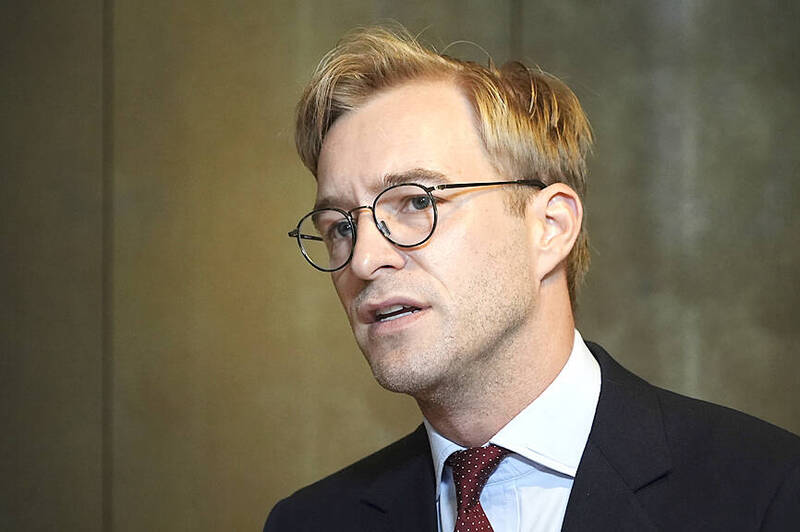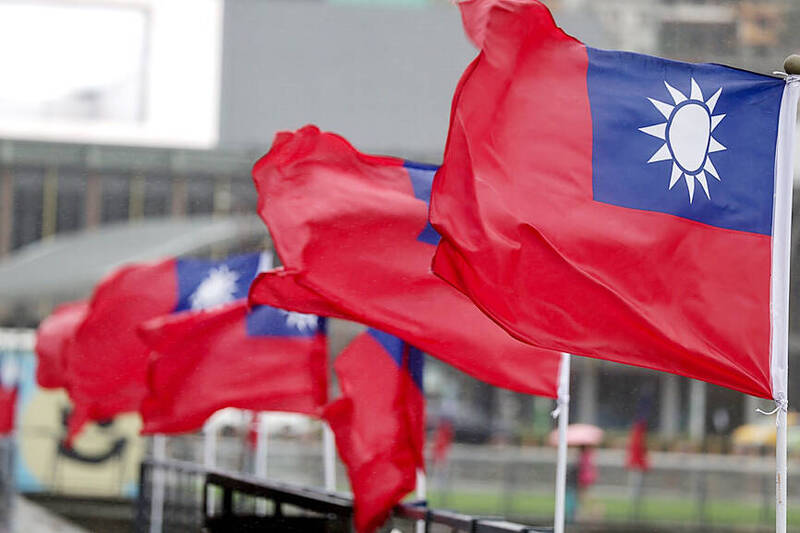《TAIPEI TIMES》 China pressures lawmakers over IPAC

Inter-Parliamentary Alliance on China executive director Luke de Pulford speaks during an interview with The Associated Press in Taipei on Saturday. Photo: Chiang Ying-ying, AP
NOT INTIMIDATED: A Bosnia and Herzegovina lawmaker said Beijing contacted her party president, who urged her not to go, but that only made her more determined
/ AP, BEIJING
Chinese diplomats are pressuring lawmakers from at least six countries not to attend a China-focused summit in Taiwan, participants said.
Politicians in Bolivia, Colombia, Slovakia, North Macedonia, and Bosnia and Herzegovina, and one other Asian country that declined to be named, say they are receiving texts, calls and urgent requests for meetings that would conflict with their plans to travel to Taipei, in what they describe as efforts to isolate Taiwan.
The Inter-Parliamentary Alliance on China (IPAC) summit officially begins tomorrow. The alliance is a group of hundreds of lawmakers from 35 countries concerned about how democracies approach Beijing.
The Associated Press spoke to the organizers and three lawmakers, and reviewed texts and e-mails sent by Chinese diplomats to the lawmakers asking whether they were planning to participate in the summit.
“I’m Wu, from Chinese Embassy,” read a message sent to Macedonian lawmaker Antonio Milososki. “We heard that you got an invitation from IPAC, will you attend the conference which will be held next week in Taiwan?”
In some cases, lawmakers described vague inquiries about their plans to travel to Taiwan. In other cases, the contact was more menacing.
One lawmaker said that Chinese diplomats messaged the head of her party with a demand to stop her from going.
“They sent a direct message to the president of my party, to stop me from traveling to Taiwan,” Bosnia and Herzegovina lawmaker Sanela Klaric said. “He showed me the message from them. He said: ‘I will advise you not to go, but I cannot stop you, it’s something you have to make a decision.’”
China routinely threatens retaliation against politicians and countries that show support for Taiwan, which has only informal relations with most nations due to Chinese diplomatic pressure.
Klaric said the pressure was unpleasant, but only steeled her determination to go on the trip.
“I really am fighting against countries or societies where the tool to manipulate and control peoples is fear,” she said, adding that it reminded her of threats and intimidation she faced during the Balkan wars in the 1990s. “I really hate the feeling when somebody is frightening you.”
The Chinese Ministry of Foreign Affairs did not immediately respond to a request for comment.
In a statement yesterday, IPAC said it “deplores and condemns the PRC’s [People’s Republic of China’s] attempt to interfere in its annual summit.”
“Democratically elected lawmakers are free to visit and support causes of their choosing. This is the normal exercise of their rights and responsibilities as elected officials,” it said.
“The PRC’s actions around IPAC’s Summit are yet another example of their brazen efforts to curtail other nations’ democratic privileges and negate Taiwan’s rights to engage in legitimate diplomatic exchanges,” it added.
The alliance, which aims to coordinate diplomacy in response to perceived threats from Beijing, has long faced pressure from the Chinese government.
Some members have been sanctioned by Beijing, and in 2021 the group was targeted by Chinese state-sponsored hackers, a US indictment unsealed earlier this year showed.
However, alliance executive director Luke de Pulford said the pressure from Chinese officials the past few days had been unprecedented.
During past meetings in other locations, lawmakers were approached by Chinese diplomats only after they concluded. This year, the pressure has sharply escalated and appears to be a coordinated attempt to stop participants from attending.
“This is gross foreign interference. This is not normal diplomacy,” De Pulford said. “How would PRC officials feel if we tried to tell them about their travel plans, where they could and could not go? It’s absolutely outrageous that they think that they can interfere in the travel plans of foreign legislators,” he said.
Lawmakers from 25 countries are expected to attend this year’s summit, which is to feature high-level meetings with Taiwanese officials, a news release said.
China has been peeling off Taiwan’s diplomatic allies, often with promises of development aid, in a long-running competition between the nations that has swung in Beijing’s favor in the past few years.
The Pacific Island nation of Nauru switched recognition to Beijing earlier this year, a move that reduced Taiwan’s number of diplomatic allies to 12.
However, China’s at times heavy-handed approach has also triggered backlash.
In 2021, Beijing downgraded relations and blocked imports from Lithuania, an EU and NATO member, after the Baltic nation broke with diplomatic custom by agreeing that a Taiwanese representative office in its capital of Vilnius would bear the name Taiwan instead of Taipei, which some other countries use to avoid offending Beijing.
The following year, the EU adopted a resolution criticizing Beijing’s behavior toward Taiwan and took action against China at the WTO over the import restrictions.
Most of the lawmakers targeted appear to be from smaller countries, which De Pulford said was likely because Beijing “feels that they can get away with it.”
However, he added that the coercive tactics has only made participants more determined to participate.
Miriam Lexmann, a Slovakian member of the European Parliament whose party head was approached by Chinese diplomats, said the pressure underscored her reason for coming to Taiwan.
We want to “exchange information, ways how to deal with those challenges and threats which China represents to the democratic part of the world, and of course, to support Taiwan,” she said.
新聞來源:TAIPEI TIMES

National flags flutter in the wind ahead of Double Ten National Day celebrations in Keelung on Oct. 9, 2022. Photo: I-Hwa Cheng, Bloomberg
















